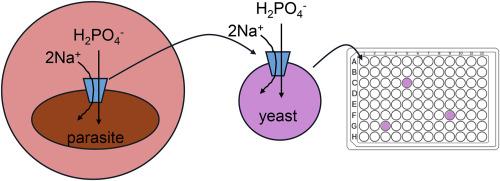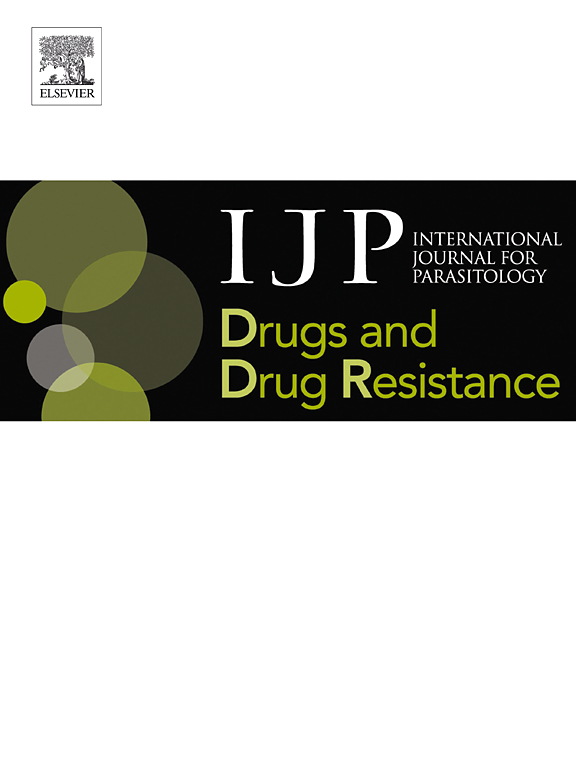基于酵母的检测方法,以确定作为潜在新型抗疟药物的疟原虫磷酸钠吸收转运体抑制剂。
IF 3.4
2区 医学
Q1 PARASITOLOGY
International Journal for Parasitology: Drugs and Drug Resistance
Pub Date : 2024-10-13
DOI:10.1016/j.ijpddr.2024.100567
引用次数: 0
摘要
疟疾每年影响近 2.5 亿人,仍然是全球公共卫生的重大威胁。疟原虫感染导致疟疾。疟疾的主要治疗方法是青蒿素类复方疗法(ACTs)。青蒿素综合疗法抗药性寄生虫的传播破坏了控制和根除疟疾的努力。因此,确定开发新型抗疟药物的新目标至关重要。磷酸盐是所有细胞必不可少的营养物质。恶性疟原虫基因组编码一种名为 PfPiT 的钠偶联无机磷酸盐转运体,它对寄生虫在无性血液阶段的增殖至关重要。因此,PfPiT 抑制剂可能是很有前途的抗疟药物。与疟原虫一样,酵母也需要磷酸盐才能生长。我们开发了一种基于酿酒酵母的生长试验,以确定 PfPiT 的抑制剂。我们利用基因组编辑技术创造了一种酵母菌株,其中 PfPiT 是唯一的磷酸盐转运体。利用放射性[32P]磷酸盐吸收测定法,在 pH 值为 7.4 的 1 mM NaCl 溶液中,测得酵母中 PfPiT 的磷酸盐 Km 为 56 ± 7 μM。在 25 mM NaCl 中,Km 降至 24 ± 3 μM,这与它是一种 Na+ 偶联共转运体是一致的。确定了酵母生长依赖于 PfPiT 介导的磷酸盐吸收的条件,并开发了一种 22 小时生长试验来筛选 PfPiT 抑制剂。在对 21 种化合物的筛选中,发现两种化合物能抑制 PfPiT 菌株的生长,但不能抑制表达 Pho84(五种内源酵母磷酸盐转运体之一)的亲本菌株的生长。放射性磷酸盐吸收实验证实了这两种化合物对磷酸盐吸收的抑制作用。生长抑制实验为筛选大型化合物库中的 PfPiT 抑制剂提供了一种简单而廉价的方法,可作为开发新型抗疟药物的起点。本文章由计算机程序翻译,如有差异,请以英文原文为准。

Yeast-based assay to identify inhibitors of the malaria parasite sodium phosphate uptake transporter as potential novel antimalarial drugs
Malaria affects almost 250 million people annually and continues to be a significant threat to global public health. Infection with protozoan parasites from the genus Plasmodium causes malaria. The primary treatment for malaria is artemisinin-based combination therapies (ACTs). The spread of ACT-resistant parasites has undermined efforts to control and eradicate malaria. Thus, it is crucial to identify new targets for the development of novel antimalarial drugs. Phosphate is an essential nutrient for all cells. The Plasmodium falciparum genome encodes a single sodium-coupled inorganic phosphate transporter named PfPiT that is essential for parasite proliferation in the asexual blood stage. Thus, PfPiT inhibitors may be promising antimalarial drugs. Like Plasmodium, yeast requires phosphate to grow. We developed a Saccharomyces cerevisiae based growth assay to identify inhibitors of PfPiT. Genome editing was used to create a yeast strain where PfPiT was the only phosphate transporter. Using a radioactive [32P]phosphate uptake assay, the measured phosphate Km for PfPiT in yeast was 56 ± 7 μM in 1 mM NaCl at pH 7.4. The Km decreased to 24 ± 3 μM in 25 mM NaCl consistent with it being a Na+ coupled cotransporter. Conditions under which yeast growth was dependent on phosphate uptake mediated by PfPiT were identified and a 22-h growth assay was developed to screen for PfPiT inhibitors. In a screen of 21 compounds, two compounds were identified that inhibited the growth of the PfPiT strain but not that of the parental strain expressing Pho84, one of the five endogenous yeast phosphate transporters. Radioactive phosphate uptake experiments confirmed inhibition of phosphate uptake by the two compounds. The growth inhibition assay provides a simple and inexpensive approach to screen a large compound library for PfPiT inhibitors that may serve as starting points for the development of novel antimalarial drugs.
求助全文
通过发布文献求助,成功后即可免费获取论文全文。
去求助
来源期刊

International Journal for Parasitology: Drugs and Drug Resistance
PARASITOLOGY-PHARMACOLOGY & PHARMACY
CiteScore
7.90
自引率
7.50%
发文量
31
审稿时长
48 days
期刊介绍:
The International Journal for Parasitology – Drugs and Drug Resistance is one of a series of specialist, open access journals launched by the International Journal for Parasitology. It publishes the results of original research in the area of anti-parasite drug identification, development and evaluation, and parasite drug resistance. The journal also covers research into natural products as anti-parasitic agents, and bioactive parasite products. Studies can be aimed at unicellular or multicellular parasites of human or veterinary importance.
 求助内容:
求助内容: 应助结果提醒方式:
应助结果提醒方式:


